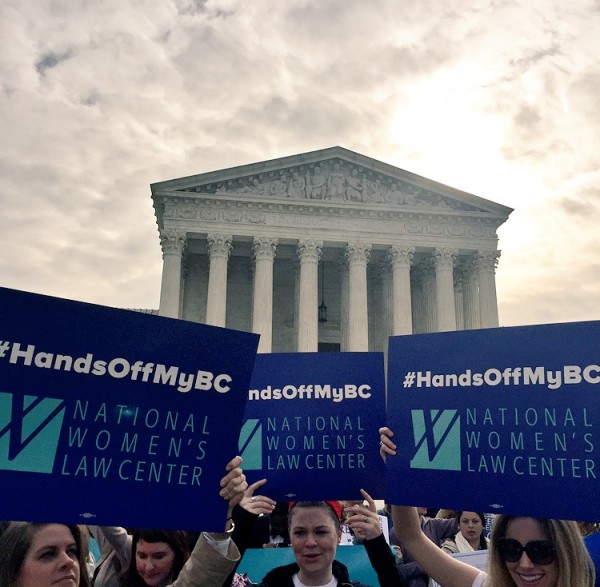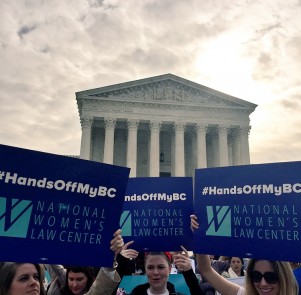Abortion rights, women of color, and LGBTQI+ people are under attack. Pledge to join us in fighting for gender justice.
The Supreme Court and Birth Control,
A Thorny Affair

 It’s been a long five years. There have been heated congressional hearings, multiple rounds of rulemaking, a ridiculous number of court cases and decisions (including several trips to the Supreme Court), and underhanded legislative attacks.
It’s been a long five years. There have been heated congressional hearings, multiple rounds of rulemaking, a ridiculous number of court cases and decisions (including several trips to the Supreme Court), and underhanded legislative attacks.
All. Over. Birth Control.
Ever since a panel of experts from the Institute of Medicine decided that birth control was one of the eight preventive health care services for women that should be covered in health insurance plans, bosses, schools, members of Congress, and radio pundits have railed against the decision. Rush Limbaugh called Sandra Fluke, a brave law student who spoke in favor of the coverage benefit, a “slut.” Billionaire bosses, such as the owner of the arts-and-crafts chain, Hobby Lobby, sued against the benefit, winning their case in a stunningly wrongly-decided Supreme Court case. And recently, some non-profits sued because they didn’t like the accommodation the Obama Administration specifically created for them. They sued because the women who work for them still got seamless coverage of birth control, and they didn’t like that even though the non-profits play no role in providing it.
For those of us who use birth control every day for decades to avoid pregnancy, manage periods or endometriosis, lower our chances of getting certain cancers, prevent pregnancy in the wake of the Zika virus threat, etc., this fight seems ridiculous. For us, the simple fact is that we believe our health insurance should cover our health care needs. And given that birth control is health care that some of us need for almost three decades of our lives, it’s ridiculous that we have had to fight over this for so long.
Unfortunately, the fight must continue after the Supreme Court’s action yesterday. But, the good news that the women who work at the non-profit employers should soon get the coverage they need even as this plays out in the lower courts. And the other good news is that the vast majority of the courts getting these cases again have already decided in favor of women’s access to birth control access. Because, in the end, what we want is for women across the country to have comprehensive coverage of birth control no matter where they work or go to school.
In its order, the Supreme Court ordered the cases to go back to the lower courts for further review. But, in sending them back, the Court order included a few remarks that I want to emphasize:
- “The Court expresses no view on the merits of the cases”
- “Nothing in this opinion, or in the opinions or orders of the courts below, is to affect the ability of the Government to ensure that women covered by petitioners’ health plans ‘obtain, without cost, the full range of FDA approved contraceptives’”
- “Petitioners have clarified that their religious exercise is not infringed…even if their employees receive cost-free contraceptive coverage from the same insurance company”
And finally from Justice Sotomayor’s concurrence (that Justice Ginsburg joined):
- “The opinion does not…endorse the petitioners’ position that the existing regulations substantially burden their religious exercise or that contraceptive coverage must be provided through a ‘separate policy with a separate enrollment process’”
- “Requiring standalone contraceptive-only coverage [as the employers proposed] would leave in limbo all of the women now guaranteed seamless preventive-care coverage under the Affordable Care Act.”
So what do I take from these quotes: the Court paved the way for the women who work at these objecting employers to get the coverage, even as the cases make their way through the courts again. The government has already said it will make sure that happens. A contraceptive-only plan like the one these employers have been touting as an alternative is not a suitable alternative (duh, said any person who has accessed birth control ever). And sending these cases back to the same courts that have already overwhelmingly given a “thumbs up” to the accommodation, we think that these cases will once again come out the right way.
And once the dust settles, women across this country will finally have health insurance that actually covers their health care.
What a concept.

